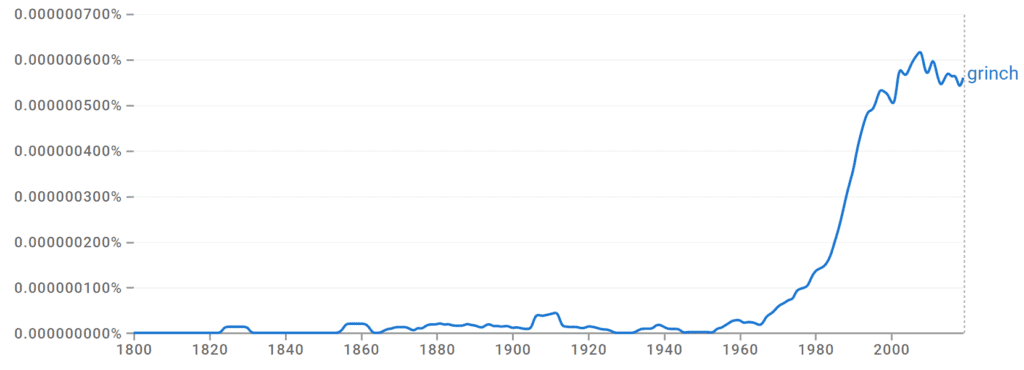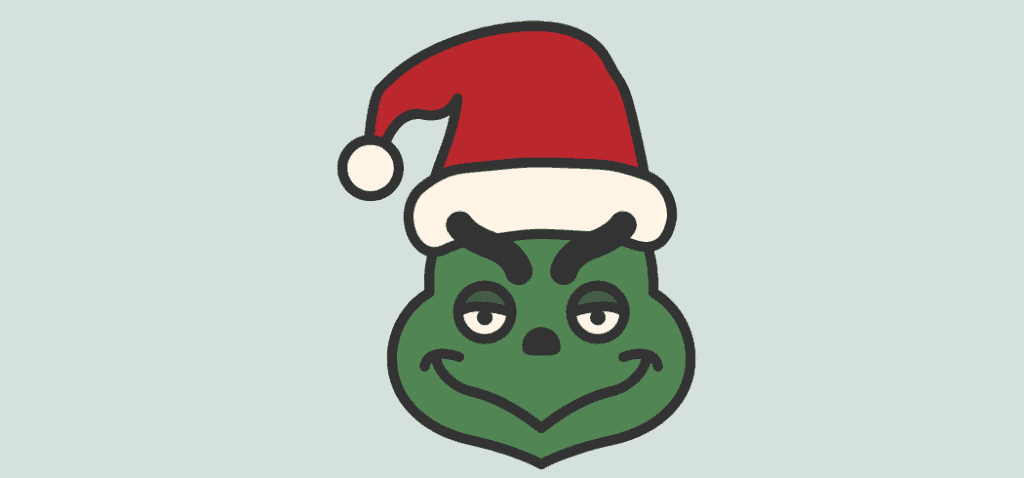Each year, as the holiday season approaches, you begin to hear the term “grinch” used in reference to a person or behaviors that might not be quite as conducive to spreading holiday cheer as they should.
The word is a term with roots in a literary character, created for children to help teach them about what the Christmas holiday is truly about: kindness and compassion towards one another.
The character has become a beloved symbol of the season, influencing movies and events around the world. We explore the origin and use of grinch below and have provided examples of the word’s use in sentences.
Origin of the Grinch

The first appearance of the word grinch appears in the early 1800s but is first documented in the literature by Rudyard Kipling in his 1892 poem, “The Lament of the Border Cattle Thief.” Kipling uses the word grinching to reference a “harsh, grating” noise.
Grinch is also a real surname and has been used as a character name in various publications through the decades.
But, the most famous and widely recognized use of the word “grinch” was coined from a literary character created by Dr. Seuss in the story How the Grinch Stole Christmas, published in 1957. A cartoon taken from the story that aired on American television in 1966 widened the appeal of the character of the Grinch, a green, miserly creature who deviously considers the best way to steal Christmas from his neighboring Whoville occupants.
The Grinch has been remade and recast multiple times through the years, always staying true to his original “Christmas stealing” behaviors. He is a popular character during the holiday season, especially because, despite his atrocious behavior and demeanor, he truly has a good and loving heart under it all.
What Is the Definition of Grinch?

The character’s popularity has made the Grinch recognizable worldwide, lending the name to various behaviors and actions. Because of this, grinch is used as both a noun and verb to describe a person, or their shenanigans, during the holiday season.
Grinch as a Noun
In the story, the Grinch is the main protagonist. He is given no other name and is referred to as Mr. Grinch or the Grinch in all subsequent storylines no matter whether his behavior is reprehensible or friendly and humbled.
According to the Merriam-Webster Dictionary, when you use grinch as a noun, you are typically calling somebody the Grinch (proper), or a grinch and are describing them as a “grumpy person who spoils the pleasure of others,” – especially during Christmastime.
Capitalize Grinch when you are making its use synonymous with the actual character, but you can keep it lowercase when using it as another name for a crabby, holiday-hating fiend.
For example:
- My father is a grinch during the holiday season. He’s always yelling at kids to get off his lawn.
- My friends have a Grinchmas gathering every year where family isn’t invited and only old friends can show up.
- You really need to stop acting like the Grinch during the company parties and start being a bit more social.
- Only grinches get upset if you decorate for Christmas before Thanksgiving.
Using Grinch in Other Parts of Speech
Even though the grammatically correct category for grinch is to use it as a noun, the popularity of the word has lent itself well when used as other parts of speech.
For example, you could say somebody is acting “grinchy” or in a “grinch-like” manner when used as an adjective. Whether you capitalize it or not depends on whether you want to lend a nod to the actual character or simply describe a grinchy-acting person.
For example:
- My grinchy brother avoids holiday gatherings because he hates talking to strangers.
- Her boss is so Grinch-like during the holidays and refuses to allow them any decorations in their personal space.
You can also substitute grinch as a verb to describe an action of moodiness or crabbiness.
For example:
- She grinched the decorations from the front porch and hid them in the garage.
- The teenagers got caught grinching ornaments from the park.
Let’s Review
Although Dr. Seuss may not have invented the Grinch, his character has made the word a household name every holiday season. Use grinch, or Grinch, as a noun to be synonymous with the nefarious, yet humbled character from How the Grinch Stole Christmas. Or, use a variation of the word to describe a noun or explain a grinchy behavior!
